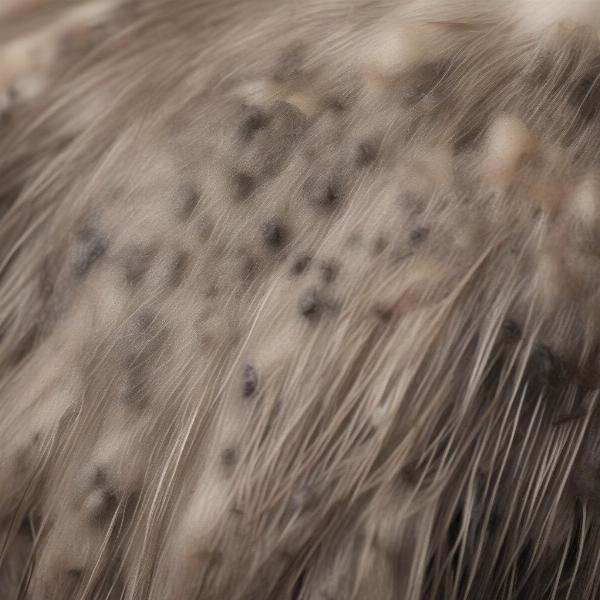Finding the best flea spray for your dog can feel overwhelming with so many options available. This article will guide you through everything you need to understand about flea sprays, from active ingredients and application methods to safety considerations and choosing the right product for your furry friend. We’ll help you navigate the market and make an informed decision to keep your dog flea-free and happy.
Understanding Flea Sprays and Their Importance
Fleas are tiny, wingless insects that thrive on the blood of mammals, including our beloved dogs. Not only are they a nuisance, causing intense itching and discomfort, but they can also transmit diseases and lead to secondary skin infections. A good flea spray is a crucial part of any effective flea control strategy.
 Dog with fleas
Dog with fleas
Types of Flea Sprays for Dogs
Several types of flea sprays are available, each with its own set of advantages and disadvantages. These include:
- Fast-acting sprays: Designed for quick knockdown of existing fleas, these sprays offer immediate relief but may not provide long-term protection.
- Long-lasting sprays: These offer protection for several weeks or even months, preventing new infestations.
- Natural sprays: Formulated with plant-based ingredients, these sprays offer a gentler approach to flea control. However, their effectiveness can vary.
Key Ingredients in Flea Sprays
Understanding the active ingredients in flea sprays is vital for choosing a safe and effective product. Common ingredients include:
- Fipronil: A broad-spectrum insecticide that kills adult fleas and ticks.
- Imidacloprid: A neonicotinoid insecticide that disrupts the nervous system of fleas.
- Permethrin: A synthetic pyrethroid insecticide that is effective against fleas, ticks, and other insects. Caution: Permethrin is toxic to cats.
- Natural ingredients: These can include essential oils like citronella, lemongrass, and peppermint oil.
How to Choose the Best Flea Spray for Your Dog
Selecting the right flea spray depends on several factors, including your dog’s age, breed, size, lifestyle, and the severity of the infestation.
- Consider your dog’s health: If your dog has sensitive skin or allergies, opt for a hypoallergenic or natural spray.
- Check for age and weight restrictions: Some sprays are not suitable for puppies or small dogs.
- Read the label carefully: Always follow the manufacturer’s instructions for application and dosage.
- Consult your veterinarian: Your vet can recommend the best flea spray for your dog’s specific needs.
Applying Flea Spray Correctly
Proper application is crucial for the effectiveness and safety of flea sprays. Always follow these guidelines:
- Wear gloves: Protect your skin by wearing gloves during application.
- Apply outdoors or in a well-ventilated area: Avoid inhaling the spray.
- Part your dog’s fur: Apply the spray directly to the skin, ensuring even coverage.
- Avoid the eyes, nose, and mouth: Be extra careful around these sensitive areas.
- Allow the spray to dry completely: Do not bathe your dog immediately after application.
What if My Dog Licks the Flea Spray?
While most flea sprays are designed to be safe when used as directed, ingestion can cause mild to moderate gastrointestinal upset. If your dog licks a significant amount of spray, contact your veterinarian immediately.
Conclusion
Choosing the best flea spray for dogs requires careful consideration of your dog’s individual needs and the severity of the flea infestation. By understanding the different types of sprays, active ingredients, and application methods, you can make an informed decision to protect your furry friend from these pesky parasites. Remember to always consult with your veterinarian if you have any concerns.
FAQ
- How often should I apply flea spray to my dog? The frequency of application depends on the specific product. Always follow the manufacturer’s instructions.
- Can I use flea spray on my pregnant dog? Consult your veterinarian before using any flea spray on a pregnant or nursing dog.
- What should I do if my dog has a flea allergy? Contact your veterinarian immediately for appropriate treatment.
- Are natural flea sprays as effective as chemical sprays? The effectiveness of natural sprays can vary. Some may be less potent than chemical sprays.
- Can I use dog flea spray on my cat? No. Many dog flea sprays contain permethrin, which is toxic to cats.
- What is the best flea prevention method for dogs? A combination of methods, such as flea sprays, collars, and oral medications, is often the most effective approach.
- How can I prevent fleas in my home? Regular vacuuming, washing bedding, and treating the environment with a flea spray can help prevent infestations.
About ILM Dog
ILM Dog is your trusted resource for comprehensive and practical advice on dog care and well-being, covering everything from breed selection and health to training, nutrition, grooming, and product recommendations. Whether you are a new or experienced dog owner, we offer expert guidance to help you navigate every aspect of dog ownership. For personalized advice or inquiries regarding our services, contact us via email at [email protected] or call us at +44 20-3965-8624.